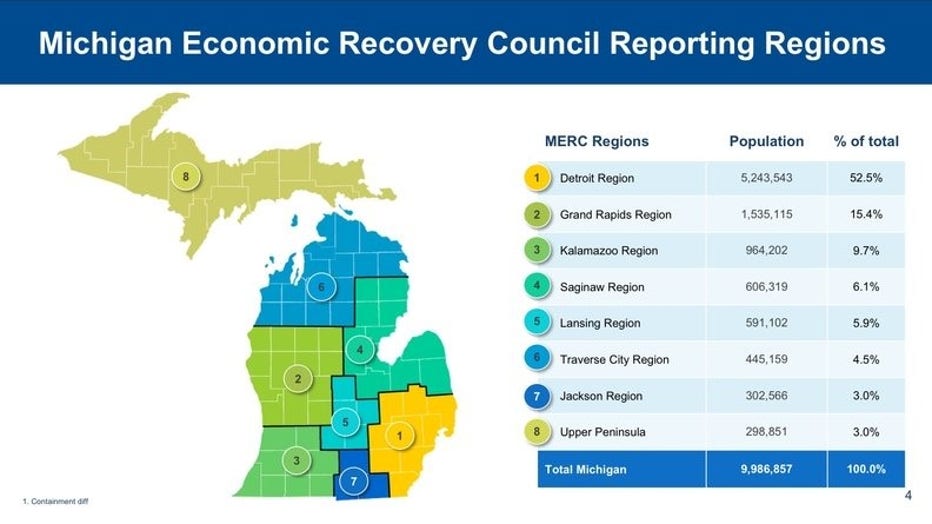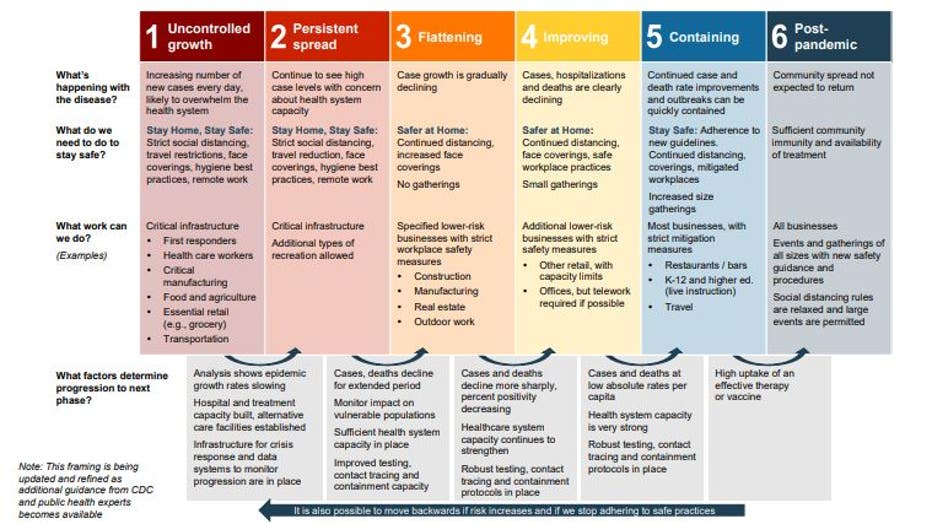Gov. Gretchen Whitmer says businesses in UP, parts of lower Michigan can reopen amid falling COVID-19 cases

LANSING, Mich. - A day after Michigan reported some of its lowest daily death totals in almost two months, Gov. Gretchen Whitmer said parts of the state can reopen.
During a press conference on Monday, Whitmer announced her newest order, which allows businesses in the upper peninsula and parts of the lower peninsula could reopen and operate in a limited capacity. The reopening will take place Friday. The decision is one that Republicans have pressed for weeks, despite Whitmer's emphasis on maintaining blanket bans on business across the state.
The order will impact bars, restaurants, and retail outlets.
The move will affect regions 6 and 8 as defined by the Michigan Economic Recovery Council (MERC), which includes the entire upper peninsula and the greater Traverse City region. Those businesses allowed to reopen must adopt safety measures and their workers must be trained in "workplace infection-control practices." While reopened, bars and restaurants must limit their capacity to 50% of their normal seating.

Gov. Gretchen Whitmer allows some regions to enter phase 4 of economic recovery
Michigan Governor Gretchen Whitmer announced on Monday that businesses in the Upper Peninsula and northern Lower Peninsula can reopen starting on Friday, May 22.
“This is a big step, but we must all remember to continue doing our part to protect ourselves and our families from the spread of COVID-19,” said Whitmer in a statement. “It’s crucial that all businesses do everything in their power to protect their workers, customers, and their families. And as we approach Memorial Day weekend, I encourage everyone to be smart and be safe. My team and I will continue to work around the clock to protect the people of Michigan.”
READ MORE: Here are the safeguards Gov. Whitmer put in place for the economies reopening in Michigan
Whitmer left the window open to for cities, villages, and townships to choose how cautious they'd like to be. In a slight nod to the expected popularity that Memorial Day weekend brings, Whitmer said she wanted to offer enough options to travelers over the holiday weekend.
Jim Carruthers, mayor of Traverse City echoed that popularity but pleaded with any visitors to wear masks, obey social distancing rules if they plan on making the trip.
The new order reflects a region-based approach that conservative lawmakers have pushed for since April, arguing the governor's executive orders that act as blanket rulings across the state put unnecessary pressure on residents living in parts of Michigan less impacted by COVID-19. Whitmer has pushed back on that request, arguing less-populated regions don't have the same health care capacity as Southeast Michigan.
The decision also reflects the state's declining spread of new coronavirus cases.

(Courtesy of the Detroit Regional Chamber)
Michigan's staggered reopening will place different regions split up by MERC's reporting under different phases of the governor's reopening plan. Region's 8 and 6 will embrace a relaxing of rules that mimic parts of phase five "containing," despite the governor labeling Michigan in phase three, "flattening." on May 7.
On top of its most encouraging daily reports since the outbreak first began, Michigan confirmed 24 more deaths on Monday, which parallels the 11 additional deaths counted on Sunday. While the low number likely reflects the lower average totals usually confirmed on weekends, it's also fewer than any number health officials have confirmed since March 24, about 14 days after the outbreak was officially confirmed in the state.

In an even more good news to report, Michigan's former epicenter and one of the worst-hit cities in the country confirmed zero deaths on Sunday. Detroit's chief health officer Denise Fair called the news "encouraging" but asked residents to be wary of daily results like that.
RELATED: House GOP releases Michigan roadmap for reopening state
Those falling numbers correlate with the growing list of businesses, public places, and travel restrictions returning to a state of normalcy. Following one week of reopened manufacturing, Ford, General Motors, and Fiat-Chrysler all brought back workers to their assembly lines on Monday. But even with returns to normal, things will look very different for those returning.
Health screenings, front door checkpoints, mandatory social distancing and plenty of personal protective equipment will be among the first things to greet workers returning to work. It's likely to be the new protocol for months to come as Michigan balances re-engaging its economy.
The balancing act will bleed into the summer and fall, where officials are already looking at what options are available to them as they consider how to restart school.
"Michigan has approximately 1.5 million K-12 public education students, about 3,500 schools and only about 100 days until we have to have our plan ready to be executed," said Whitmer during a Friday press conference. Last week, she unveiled a 20-person Return to Learning Advisory Council which will guide the state's path forward on education. It will be made up of students, parents, educators, administrators, and public health officials.
Much like the guides that businesses are following to reopen their doors, schools will need to implement their own safety protocols when the fall semester returns. Central Michigan, Western Michigan, and Ferris State University have all confirmed their main campuses will be open in the fall with added safety measures in place.

After two months off, Fiat-Chrysler employees return to work
Employees at Fiat-Chrysler will return to work for the first time in more than two months. As the state still battles the COVID-19 pandemic, workers will reenter the workforce amid new precautions and safety measures - which start at the door.
How it looks for public schools will be different. While COVID-19's effects on elderly individuals are well documented, it's unclear how children are impacted. While they probably don't carry the same underlying conditions that worsen symptoms in older residents, there are studies documenting unusual cases of inflammation in the heart and blood vessels in children. Multiple cases have already been reported in Michigan.
Among other questions that are top of mind for public health officials is what kind of increase in cases will follow the state's reopening. Whitmer and her chief medical executive Dr. Joneigh Khaldun have both warned a second surge in coronavirus-linked cases could decimate the state's hurting economy and quickly shrink the fragile health care capacity.
Hospitalizations, like new cases and deaths, have been declining for some time. Metrics like those, in addition to boosting testing capacity, will inform how and when the state can reopen.
During her press conference, Whitmer said the state had conducted 15,000 tests daily over the last seven days.

